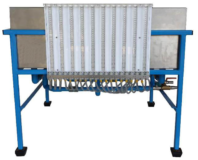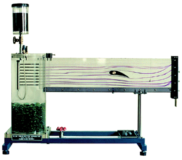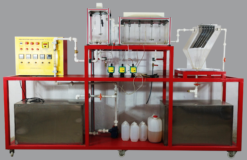Fluidised Bed Formation Apparatus Model FM 91
Home » Products » Fluidised Bed Formation Apparatus Model FM 91
Fluidised Bed Formation Apparatus Model FM 91
Sci-tech Fluidized Bed Formation Apparatus Model FM 91 features two transparent test tanks for fluidized bed formation in water and air. A diaphragm pump delivers water from a storage tank into the bottom of the left side test tank. The water flows upwards through a porous sintered-metal plate. On the sintered-metal plate is a bulk solid. If the velocity of the water is less than the so-called fluidization velocity, the flow merely passes through the fixed bed. At higher velocities the bed is loosened to such an extent that individual solid particles are suspended by the fluid. If the velocity is increased further, particles are carried out of the fluidized bed. A filter at the top of the test tank holds these particles back. The water flows back into the storage tank.
The right-side test tank is similar in construction to the left-side one. An air flow generated by a compressor flows through it.
Manometers are mounted on both test tanks to measure the pressure loss. The flow rates are adjusted by way of valves, and can be read from flow meters. The
| Size: | 70cm x 30cm x 60cm (LxWxH) |
| Weight: | 20 kg |
Item Description
Features
- Experimental investigation of the fluidization process
- Comparison of fluidized bed formation in gases and liquids
- Pressure loss in fixed beds and fluidized beds
- Optimum observation of processes through transparent tanks
Bulk solids can be transformed from a fixed bed into a fluidized bed when liquids or gases pass through them. The areas of application of fluidized beds include the drying of solids and a wide variety of chemical processes.
Sci-tech Fluidized Bed Formation Apparatus Model FM 91 features two transparent test tanks for fluidized bed formation in water and air. A diaphragm pump delivers water from a storage tank into the bottom of the left side test tank. The water flows upwards through a porous sintered-metal plate. On the sintered-metal plate is a bulk solid. If the velocity of the water is less than the so-called fluidization velocity, the flow merely passes through the fixed bed. At higher velocities the bed is loosened to such an extent that individual solid particles are suspended by the fluid. If the velocity is increased further, particles are carried out of the fluidized bed. A filter at the top of the test tank holds these particles back. The water flows back into the storage tank.
The right-side test tank is similar in construction to the left-side one. An air flow generated by a compressor flows through it.
Manometers are mounted on both test tanks to measure the pressure loss. The flow rates are adjusted by way of valves, and can be read from flow meters. The test tanks are removable. This makes it easy to change the bulk solid filling.
Glass-shot beads in a range of particle sizes are provided as the bulk solid filling.
Optional ‘Sci-Cal’ Computer Control Software & Interface in ‘LabVIEW’
Technical Specifications
Specifications
- Investigation of fluidized bed formation of solids in air and water
- 2 transparent test tanks to observe fluidized bed formation in air/water
- 1 manometer per tank to measure the pressure loss through each test tank
- 1 steel rule per tank to measure the change in height of the fluidized beds
- Both test tanks removable for filling
- Storage tank with diaphragm pump for water supply
- Diaphragm compressor with compressed air accumulator for compressed air supply
- Adjustment of flow rate for both media by valves and flow meter
- Optional ‘Sci-Cal’ Computer Control Software & Interface in ‘LabVIEW’
Technical Specifications
2 test tanks
- length: 550mm
- inside diameter: 44mm
- scale division: 1mm
- Material: PMMA
Diaphragm pump (water)
- flow rate: 1,7L/min
- head: 70m
Diaphragm compressor (air)
- volumetric flow rate: 39L/min
- pressure: 2bar
Tanks
- water storage tank: approx. 4L
- compressed air accumulator: 2L
Measuring ranges
- pressure (water): 0…500mmWC
- pressure (air): 0…200mmWC
- flow rate (water): 0,2…2,2L/min
- flow rate (air): 4…32L/min
Optional ‘Sci-Cal’ Computer Control Software & Interface in ‘LabVIEW’.
‘Sci-Cal’ software & hardware has been designed for use with more than 600 ‘Sci-tech’ trainers. ‘Sci-Cal’ comes in a module that can be fitted or mounted on the Sci-tech trainers very easily.
‘Sci-Cal’ box has 11 inches front HMI interactive panel, inside are i3 processor computer with it’s own hard drive & software processor with 16 to 32 analog and 16 to 32 digital signal data-loggers. The ‘LabVIEW’ processes the input signal with in-built data and formulae to tabulate results for the Sci-tech trainers.
‘Sci-Cal’ box has HDMI output for connection to a projector or an electronic whiteboard or a monitor.
‘Sci-Cal’ box has input ports for inputs from the Sci-tech trainer sensors.
‘Sci-Cal’ eliminates requirement of external computer.
Experiments:
- Fundamentals of the fluidization of bulk solids
- Observation and comparison of the fluidization process in water and air
- Pressure loss dependent on flow velocity
- Pressure loss dependent on the type and particle size of the bulk solid
- Determination of the fluidization velocity and comparison with theoretically calculated values (Ergun equation)
- Dependency of the height of the fluidized bed on the flow velocity
- Verification of Carman-Kozeny equation
Model Number
FM 91
See also different:

Sci-tech Ground Water Flow Unit Model 70 consists of Sand Tank manufactured from Fibre Reinforced Plastic for durable life & corrosion free operation. The tank is mounted on a free-standing steel frame. The tank is to be filled with layer [...]



